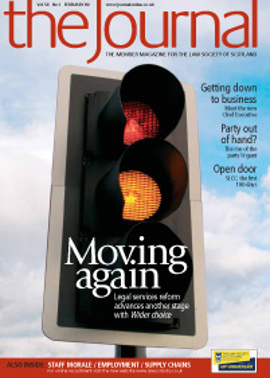Cross-border disputes: new rules
Service of documents – 13 November 2008
Regulation (EC) No 1393/2007 on the service in the member states of judicial and extrajudicial documents in civil or commercial matters applies from 13 November 2008. It applies where a document has to be transmitted from one member state to another for service there, and where the address is known. It does not cover revenue, customs or administrative matters. Member states designate persons competent to transmit and receive documents to and from other member states and must inform the Commission of these transmitting and receiving agencies (article 2).
The law in Scotland has been amended by the European Communities (Service of Judicial and Extrajudicial Documents) (Scotland) Amendment Regulations 2008, made on 13 November 2008, which came into force on 5 December 2008. These Amendment Regulations also remove approved solicitors as a transmitting and receiving agency designated under article 2 of the EC Service Regulation.
An Act of Sederunt (Fees of Messengers-at-Arms) (EC Service Regulation) 2008 was made on 7 November 2008 and came into force on 13 November. It makes provision for the fees payable to messengers-at-arms for service of a document.
The Sheriff Court Rules have also been amended by the Act of Sederunt (Sheriff Court Rules) (Miscellaneous Amendments) (No 2) 2008 made on 7 November 2008.
European order for payment procedure – 12 December 2008
Regulation (EC) No 1896/2006 creates a European order for payment procedure (EPO), which applies from 12 December 2008. It is a simplified procedure for obtaining judgment on uncontested pecuniary claims for a specific amount (to which there is no threshold) in civil and commercial cross-border cases. It does not apply to Inland Revenue, customs or administrative matters, or rights in property arising out of matrimonial matters or wills and succession. It sets out minimum standards and removes the need for any intermediate proceedings in the member states of enforcement prior to recognition and enforcement. It is based on a system of standard forms for ease of purpose.
The sheriff court rules have been changed to support the EPO by the Act of Sederunt (Sheriff Court European Order for Payment Procedure Rules) 2008, made on 19 December 2008, which came into force on 12 January 2009.
European small claims procedure – 1 January 2009
Regulation (EC) No 861/2007 creates a simplified European small claims procedure which applies from 1 January 2009. It introduces standard forms and time limits to simplify and speed up litigation in cross-border civil and commercial cases where the value of the claim does not exceed 2000 euro. It does not apply to revenue, customs or administrative matters, to maintenance obligations or rights in property arising from marriage or succession, bankruptcy or similar proceedings, social security, arbitration, employment law or violations of privacy or defamation. The judgment given is enforceable in any member state as if it were a domestic judgment. Unlike the EPO, it is not restricted to pecuniary claims.
The sheriff court rules have been changed to support the European small claims procedure by the Act of Sederunt (Sheriff Court European Small Claims Procedure Rules) 2008, made on 19 December 2008, which came into force on 12 January 2009.
Conflict of law rules: non-contractual obligations – 11 January 2009
Regulation (EC) 864/2007 on the law applicable to non-contractual obligations (Rome II) introduces new EU conflict of law rules for non-contractual matters which apply from 11 January 2009. It applies to non-contractual obligations in any situation involving a choice of different member states’ national laws. It aims to ensure that courts in all the EU member states apply the same rules to decide which law should apply to cross-border disputes concerning non-contractual obligations.
The law in Scotland has been amended by the Law Applicable to Non-Contractual Obligations (Scotland) Regulations 2008, made on 3 December 2008, which came into force on 11 January 2009.
Conflict of law rules: contractual matters – 17 December 2009
Regulation (EC) 593/2008 on the law applicable to contractual obligations (Rome I) introduces new EU conflict of law rules for contractual matters which apply from 17 December 2009. It retains the freedom of parties to choose the applicable law. It provides a detailed set of rules to determine the applicable law in instances where the parties fail to reach such an agreement. The UK intends to opt in to the regulation.
If you have any questions, or for further information, please contact Susan Clements, Justice and Home Affairs Policy Adviser at the Law Societies' Joint Brussels Office.
e: brussels@lawsociety.org.uk
In this issue
- Cross-border disputes: new rules
- Beyond the downturn
- Take a business view
- Amber alert
- ARTL - time to reflect
- Jack to the future
- Party time
- Head of steam
- Big names for Society's big date
- Employment: without prejudice
- Simple steps
- Taken on credit
- Positive returns
- Electrical storm on the horizon?
- What's on file?
- Ask Ash
- New cases, old problems
- Fair sharing of less
- Beware - simpler rules
- Shifting sands
- Offer you can't refuse
- Website review
- Book reviews
- Weakest link
- Servitudes - new ground?






